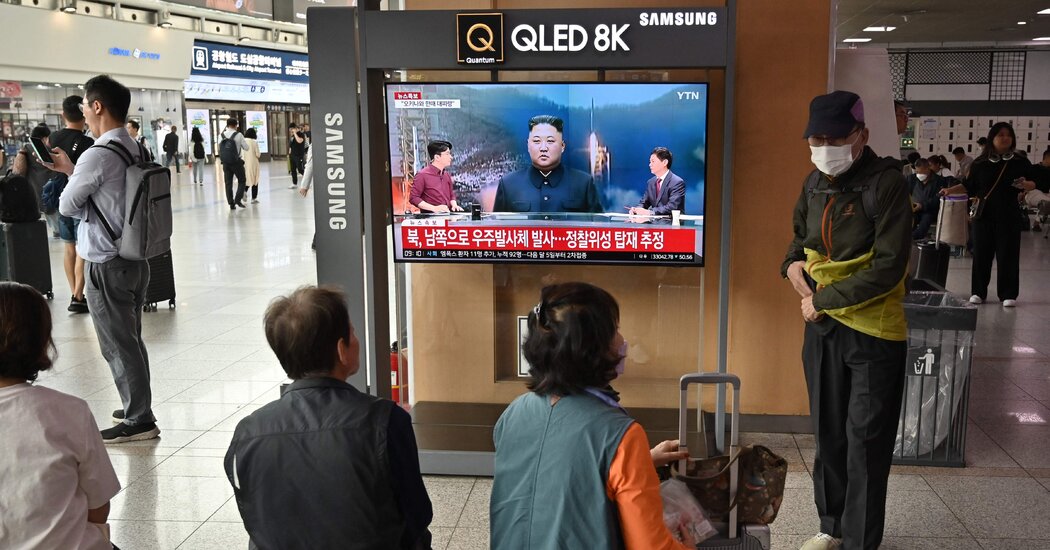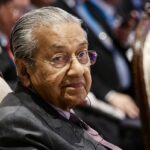Global Courant 2023-05-31 14:47:59
SEOUL – The emergency siren started wailing at 6:32 am. Minutes later, personal cell phones in Seoul blared with a government warning urging residents to “prepare for evacuation,” children first and the old and frail.
For half an hour on Wednesday morning, confusion and panic reigned in this city of 10 million as news spread that North Korea had fired a missile. Then the next wave of reports hit: The Interior Ministry of the South issued a notice saying the earlier warning was a “false alarm.”
Fear soon turned to anger and annoyance.
“They screwed up big time,” said Lee Jae, an office worker in Seoul who was awakened by the sirens.
South Koreans, accustomed to North Korea’s frequent provocations, got a disturbing taste of how their country might respond to a major military strike on Wednesday when their government failed to properly use its public warning system at a time of heightened tension in the region.
The confusion began after North Korea launched a missile from the northwestern tip of the Korean peninsula at 6:27 a.m. despite the action being in violation of multiple United Nations Security Council resolutions.
Data released by the North on the missile’s pre-programmed trajectory showed it would fly south, over the sea between the Korean Peninsula and China, and over the waters east of the Philippines.
It is rare for a North Korean projectile to fly south. In 2016, when a North Korean missile carrying a satellite flew south, South Korea issued a warning on Baekryeongdo, an island near the northwestern border with the north.
Two minutes after launching on Wednesday, South Korea issued a similar alert to Baekryeongdo, but officials were investigating why the same alert was also issued to Seoul, even though the missile flew hundreds of miles west of the city.
After issuing the warning about Baekryeongdo, the Interior Ministry left it to regional governments to decide whether to follow suit, the Seoul city government said. Seoul officials said they had decided to issue a warning in the city as a precaution, even if they had to withdraw it. The mayor of Seoul later apologized publicly.
For Chung Sung-hee, 62, the confused reaction was infuriating. Ms. Chung said she was preparing breakfast at her home in downtown Seoul when she heard the telephone alarm followed by a loudspeaker broadcast. When she opened the window and trained her ears, all she could discern was that it was “a real situation,” not a practice.
“They should have told them what was going on and where to go,” Mrs. Chung said. “Who would evacuate with a message like that?” When she received the second report that it was a false alarm, Ms. Chung said she couldn’t help but curse the authorities.
“I blurted out, ‘These lunatics – isn’t there one thing they can do right?'” she said. “The government should tell you, ‘this is the situation.’ If they just say “evacuate” out of the blue, what is anyone supposed to do?
South Koreans harbor great skepticism about their government’s ability to cope with major disasters. President Yoon Suk Yeol’s administration was widely accused of failing to prevent or react quickly enough to the deadly crowd in Seoul that killed nearly 160 people in October.
Critics say Wednesday’s failed response was symptomatic of a government that has defended a tough stance on North Korea but has failed to reassure the public of its safety amid the north’s growing nuclear threat.
“It is right that the Yoon administration has a sense of crisis with North Korea,” said Ahn Byong-jin, a political scientist at Kyung Hee University in Seoul. “But there has been little training for the general public to live with it. The commotion we had this morning is a good reflection of how the government is not understanding and responding to this new normal with North Korea.”
Min Yun-geun, a student in Seoul, feared that false alarms, if repeated, could desensitize people to actual emergencies. “I realize we’re not really that prepared for war,” he said.
Mr Yoon’s office condemned the North’s missile launch as a “serious provocation”, calling it a long-range missile test masquerading as a satellite launch.
North Korea confirmed that the launch failed and that the missile fell into the sea west of the Korean Peninsula after the second stage vehicle malfunctioned. The country promised to plan a new launch as soon as possible. South Korea collected debris to collect clues about the North’s missile technology.
By launching a missile to the south and trying to put a military spy satellite into orbit, the north escalated its nuclear threat, said Lee Byong-chul, a nuclear policy researcher at the Institute for Far Eastern Studies at Kyungnam University in Seoul.
“North Korea has already shown that its missiles are powerful enough to fly the desired distances, but what it lacks is the ability to guide them to targets with precision,” Lee said. “Military spy satellites can help the North provide that capability.”
While some were frustrated with the South Korean government’s response to the launch, others said they’d rather officials err on the side of caution in such situations. “It’s better they did it and got chewed out than doing nothing and got chewed out,” says Lee Jae-hee, 45.
After seeing the warning, Mr. Lee that he had seen a news report that it was about the space launch that had warned the North and went back to sleep. “When you hear buildings exploding and things roar, it’s probably too late to go anywhere anyway,” he shrugged.
South Korea held regular civil defense exercises during the Cold War, with sirens blaring and megaphones urging people to take shelter in subway stations, underground parking garages and basements of large buildings. Streets were traffic free.
The country now has thousands of underground emergency shelters.
But those exercises have become a distant memory for many across the country, especially after Seoul began engaging in more diplomacy with North Korea under Mr. Yoon’s predecessor, Moon Jae-in. South Korea last held an airstrike exercise in 2017.
With tensions rising in the region, Mr Yoon’s government has been slow to reintroduce civil defense exercises. On May 16, South Korea held its first nationwide civil defense exercise in six years, but it was limited to government officials and schoolchildren.
Jeung Yeon-cheon, 36, who lives on the 18th floor of an apartment building in Seoul, said he took part in May’s training, though he thought any risk of a North Korean attack seemed slim. He quickly dismissed the alarm as a beep on Wednesday.
“It didn’t feel that serious,” he said.








